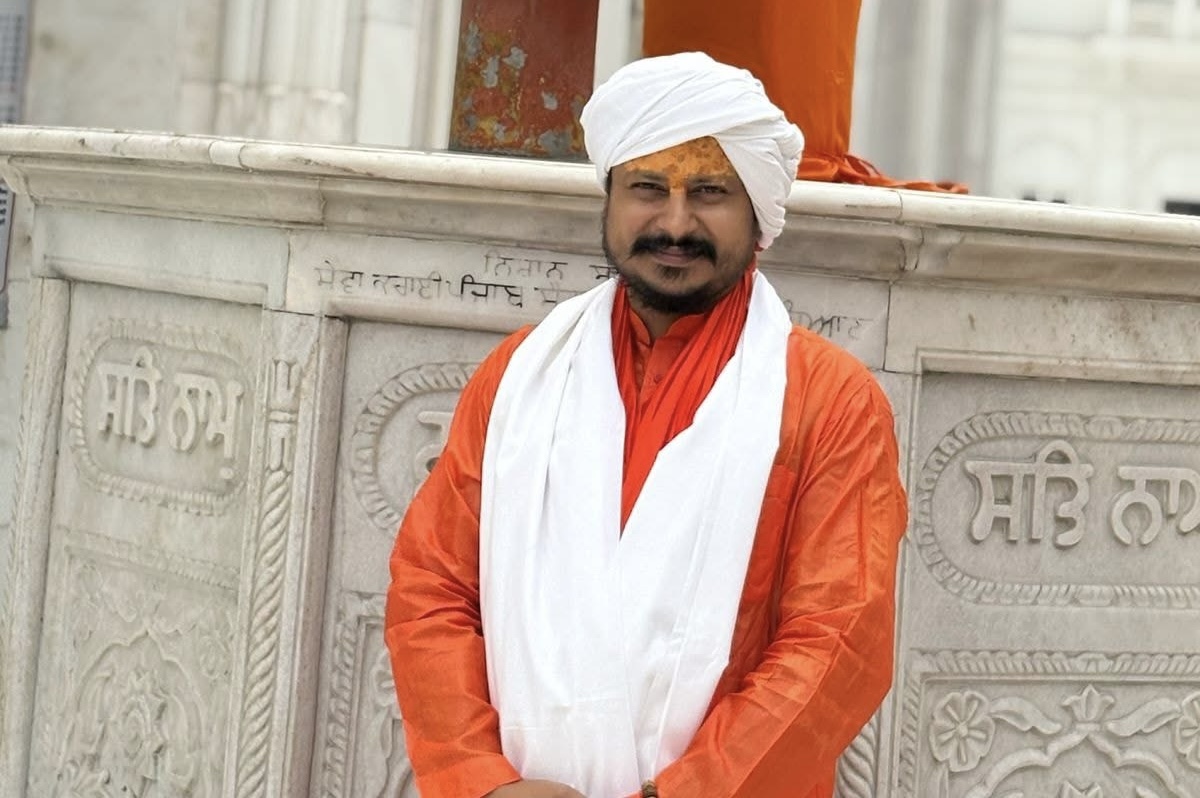Swami Raghavendra is a Hindu religious leader based at the Ram Janaki Ashram in Muzaffarpur, Bihar. He leads the Satya Dharam Samvad (SDS), an organization of Hindu monks and religious leaders dedicated to combating hatred and promoting a message of fraternity and compassion.
We spoke with Swami Raghavendra about his efforts to counter hate, the current climate of division, and the steps needed to promote greater harmony.
The Umeed Project: What inspired you to speak out against hate speech?
Swami Raghavendra: I have a plot of land in Bihar with a mazar, which we refer to as Miya. Spiritual leaders from all religions gather there. We have always lived in peace and with harmony but lately we’ve begun to witness growing tensions.
I’ve read Swami Vivekananda and Sahajananda—they played a big role in inspiring me to do this work. Mahatma Gandhi is also a source of inspiration. When we deeply understand our religion, hate naturally falls away.
It was after the 2021 Haridwar Dharma Sansad, led by Yati Narsinghanand, where blatant hate speeches were delivered, that I felt compelled to speak out. He completely maligned Hinduism. A religious gathering that calls for the killing and erasure of a community goes against the very spirit of religion. That was the main reason.
There’s a shlok in the Atharva Veda about India being like a land of many religions, languages, and cultures—nurturing all like a cow feeds her calf. All religions should be treated equally, with love and kindness.
Umeed: Did you face any challenges when you started out speaking against hatred?
Swami Raghavendra: Yes, a lot. But we follow what’s written in the Bhagavad Gita (holy Hindu scripture), and we don’t focus on personal hardships. We don’t talk about the adversities we face. Becoming sadhus (Hindu holy man) was our way of dedicating our lives to this land, to this country, to its people.
Shankar Dayal Saksena once wrote, “A nation is not a piece of paper.” A nation can only progress when we live peacefully, without hurting anyone’s religion or culture. That’s what we’ve dedicated our lives to.
Umeed: Why do monks like Narsinghanand give hate speeches?
Swami Raghavendra: They want shortcuts to success. They’re going through an identity crisis. They think this will make them popular in modern India. Some imams and pastors also go on national TV debates for Rs. 5,000 and mislead the masses and divide people. This is being deliberately done by people who own these media channels to keep Indians divided.
Umeed: What is hatred on rise even in places where people used to live peacefully?
Swami Raghavendra: Hatred was much lower in villages. People lived peacefully. But mobile phones, fake news, and social media platforms are spreading hate. Hate can’t last a lifetime. Tell me—can you have a fever forever?
Umeed: No.
Swami Raghavendra: Exactly. Love is an innate human feeling. Humans cannot live in hate forever. Psychologically, hate is a kind of illness. It doesn’t last, it hasn’t in the past, and it won’t in the future—this is my prophecy.
The only promise we must make is to stay on the right path and work for communal harmony. With our wealth and our health, we must dedicate ourselves. This hatred will end soon.
Umeed: What are the steps to combat this?
Swami Raghavendra: Conversation. Dialogue is the only way. People need to engage in debate and discussion and truly understand each other. After interfaith dialogues, intra-Hindu conversations are just as important.
So first, we need conversation. Second, we must celebrate festivals together. Third, we must support and uplift those sadhus and sants (saints) who promote peace and communal harmony—those who say “tum gulab lao, hum Ganga jal layein (You bring roses, we will bring Ganga water) ,” upholding the Ganga-Jamuni tehzeeb (It refers to the centuries-old syncretic culture of northern India that blends Hindu and Muslim traditions, languages, arts, and customs, symbolizing communal harmony and shared heritage). These peacemakers should receive resources. When a sadhu gives hate speech, he gets security, cars, and funding. Power changes people. We need religious figures and leaders who speak the language of love.
Umeed: How do Hindu religious scriptures address hate and divisive ideologies?
Swami Raghavendra: Our scriptures teach that we must not go against any religion—and anyone who does, is not following true dharma. What has the Sangh (Hindu nationalist groups) done? They’ve misled people by misinterpreting our texts and claiming things that aren’t true. The sages called that dharma which does not go against any other faith. Religion is not a political party
Umeed: What is your message for aspiring young Hindu spiritual leaders, monks, and saints?
Swami Raghavendra: I’ll quote Acharya Vinoba Bhave: every spiritual leader should read the scriptures of all religions. Secondly, remember that humanity and love are the first steps toward spirituality. Never spread hatred among people or between religions.
Umeed: What is your idea of India?
Swami Raghavendra: India should be a garden where every flower can bloom freely and independently, spreading its own unique fragrance.

